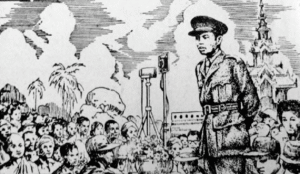A Cultural Reflection by Sai Kham Leik
Translated and Edited for MMNN
Introduction
Among Myanmar’s most prolific and poetic songwriters stands Sai Kham Leik—a gentle soul and intellectual rebel who penned more than 300 iconic songs, nearly all of which became cultural hits. Behind his lyrical mastery lay both artistry and courage. During university holidays, he would travel to remote Shan villages to teach the Shan language—an act that earned him the suspicion of military intelligence, even prompting investigations involving the Rector of the Institute of Medicine (IIM), who boldly stood by him.
Later, as rumors swirled during the Thein Sein–DASSK era that he was offered the Vice Presidency—a role many say he humbly declined to avoid becoming a puppet—Sai Kham Leik quietly stepped back from public life. He eventually retired as an anatomist, leaving behind a legacy not just in music, but in principled silence.
One of his most cherished songs, “I Wished for a Queen, but Married a Queen”, came from a deeply personal place. The story behind it was published in Pei Phu Lwar Magazine in October 1981 during an interview with journalist Win Ko Ko.
The Song’s Origin: A Misplaced Name, A Misplaced Role
Win Ko Ko:
Could you tell us how your song “I Wished for a Queen, but Married a Queen” came into being?
Sai Kham Leik:
It goes back some five or six years. I was still a medical student. My wife, on the other hand, was already a practicing doctor. One day, she showed me our wedding invitation card. When I read it, I noticed it said:
“Dr. Daw Nwe Nwe Tin and husband.”
That was it—my name wasn’t even mentioned.In Myanmar culture, we often value the man as the “head of the house,” so seeing my name erased from such an important occasion made me feel like I’d been sidelined. I didn’t say anything at the time, but it hit me hard. It was a quiet pain—a subtle one.
I tucked the feeling away, and over time, it turned into lyrics. I tried to write the song several times but discarded every early draft. It wasn’t until I was working as a House Officer at the People’s Hospital in Maymyo that the full song came together.
Queen as a Consort… or as a Monarch?
Win Ko Ko:
What about the choice of words—“Queen” as a consort versus “Queen” as a monarch?
Sai Kham Leik:
In Burmese, “Mi Phura” (မိဖုရား) implies the gentle consort of a King—a woman whom you want to protect, care for, walk beside. But “Bhu Reng Ma” (ဘုရင်မ) feels different; she’s the one who leads, who rules, who commands.In English, both are just “Queen,” and there’s no sharp distinction. But in our language and culture, the difference is emotional, even existential.
I wanted to be the King to a Queen Consort, but I found myself merely the husband of a Queen Monarch. That realization was jarring—and poetic.
A Subtle Critique of Patriarchy… and Modern Invitations
Sai Kham Leik confessed he never confronted the person who worded the wedding card. Perhaps they were unaware of the implication; or maybe it was a passive assertion of changing gender roles. Either way, the experience sparked introspection about social norms, language, and masculine pride.
The song became not only a humorous take on being “outshined” but also a soft challenge to traditional gender hierarchies and invitation-writing etiquette.
“When I hear the word ‘Mi Phura’, I want to reach out, protect, walk beside.
When I hear ‘Bhu Reng Ma’, I feel like I’ve become her consort—relegated to the background.”— Sai Kham Leik
And with a smile, he ended:
“In this world, I have only one thing to say:
‘I’m always one step behind.’
I’ve always been behind, I still am, and I probably always will be.”
A Song That Touched a Nation
The song has endured not because it lamented a bruised ego, but because it captured a quiet, universal truth: in love and in life, the roles we dream of and the roles we receive are often not the same. Sai Kham Leik’s gentle honesty continues to echo through his music and memory.
Myanmar never crowned him Vice President—but we remember him as our poetic monarch of the heart.
“I asked for a Queen… and married a Queen.”
One who walks ahead—not beside.”
Published by MMNN
Accompanied Video:
Translation & Adaptation by MMNN Editorial Team.
လိုချင်တာမိဖုရားညားတော့ဘုရင်မ…။ ၁၉၈၁ အောက်တိုဘာလထုတ် ပေဖူးလွှာ မဂ္ဂဇင်းမှာ ပါခဲ့တဲ့ ဆရာ၀င်းကိုကို နဲ့ ဆရာစိုင်းခမ်းလိတ်တို့ရဲ့ အမေးအဖြေလေး တချို့ပါ။ ဆရာ စိုင်းခမ်းလိတ်ကြီး ရှင်းပြတဲ့ “လိုချင်တာမိဖုရား ညားတော့ ဘုရင်မ” ဆိုတဲ့ သီချင်း ဖြစ်ပေါ်လာပုံလေးပါ။ ဒီသီချင်းကိုတော့ တော်တော်များများ သိနေကြမယ်လို့ ယူဆပါတယ်။ သီချင်းတစ်ပုဒ်ကို ဘယ်လို ခံစားချက်တွေနဲ့ ရေးဖွဲ့ခဲ့တယ်ဆိုတာ ရှင်းပြပေးတဲ့ ဆရာလိတ် နဲ့ ဒီလို အဖြေတွေကို ကျွန်တော်တို့ ဖတ်ခွင့်ရအောင် မေးမြန်းပေးခဲ့တဲ့ ဆရာ ၀င်းကိုကို ကို ကျေးဇူး အထူးတင်ပါတယ် ခင်ဗျာ။ #BC ——————————————– ၀င်းကိုကို – လိုချင်တာမိဖုရား ညားတော့ဘုရင်မ သီချင်း ဖြစ်ပေါ်လာပုံကလေး ပြောပြပါဦး။ စိုင်းခမ်းလိတ် – ကြာတော့ ကြာခဲ့ပါပြီ။ လွန်ခဲ့တဲ့ ငါးနှစ်ခြောက်နှစ်လောက်ကပေါ့။ ကျွန်တော်က အဲဒီတုန်းက ဆေးကျောင်းသားပဲ ရှိသေးတယ်။ ကျွန်တော့်အမျိုးသမီးကတော့ ဒေါက်တာဖြစ်နေပြီ။ တစ်နေ့တော့ အမျိုးသမီးက မင်္ဂလာဆောင်ဖိတ်စာတစ်ခု ကျွန်တော့်ကို လာပြတယ်။ ကျွန်တော်က ဖတ်ကြည့်လိုက်တော့ ဒေါက်တာဒေါ်နွဲ့နွဲ့တင် နှင့် ခင်ပွန်းလို့ ရေးထားတာ တွေ့ရတယ်။ ဗြုန်းဆို ကျွန်တော့်စိတ်ထဲမှာ တစ်မျိုးပဲ ခံစားလိုက်ရတယ်။ ဘာဖြစ်လို့လဲ ဆိုတော့ဗျာ ကျွန်တော်တို့ ဗမာပြည်မှာ (မူရင်းအတိုင်း ရေးလိုက်ပါတယ်ဗျာ) သျှောင်နောက်ဆံထုံးပါ ဆိုတာလို ယောက်ျားကိုပဲ ရှေ့တန်းက ဦးစားပေး ထားကြပါတယ်။ ခု…ဖိတ်စာကျတော့ အမျိုးသမီးနာမည်ကို ရှေ့က ထားပြီးတော့ ကျွန်တော့်ကိုတော့ နောက်မှာ နာမည်တောင် မတပ်ပဲနဲ့ ( နှင့်…ခင်ပွန်း ) လို့ပဲ ဖေါ်ပြထားတာ ဆိုတော့ တော်တော်လေး ခံစားရတယ်။ ဒီဖိတ်စာကို ဖတ်ပြီးတိုင်း တအုံနွေးနွေးနဲ့ စိတ်ထဲမှာ ခံစားရခက်နေတယ်။ ဒီအကြောင်းနဲ့ပတ်သက်ပြီး သီချင်း တစ်ချိန်ချိန်မှာ ရေးမယ်လို့ တေးထားခဲ့တယ်။ ဒါပေမယ့် တစ်ကြောင်းရေးပြီး မကြိုက်လိုက်၊ သုံးလေးကြောင်းရေးပြီး မကြိုက်လိုက်နဲ့ တော်တော်ကြာသွားတယ်။ နောက်ဆုံး ကျွန်တော် မေမြို့ ပြည်သူ့ဆေးရုံမှာ လက်ထောက်ဆရာ၀န်အဖြစ် တာ၀န်ထမ်းဆောင်ရတဲ့ အချိန်ကျမှ ဒီသီချင်းကို ရေးဖြစ်တော့တယ်။ ဒီလို ခံစားရတဲ့ လူတွေ ကျွန်တော်အများကြီး တွေ့ဖူးပါတယ်။ ခုနက ကျွန်တော်ပြောခဲ့တဲ့ ဖိတ်စာ ရေးလိုက်တဲ့သူဟာ လူမှုရေးအရ နားမလည်ပဲနဲ့ ရေးလိုက်တာလား။ ဒါမှမဟုတ် သိလျက်နဲ့ ယဉ်ယဉ်ကလေး နဲ့ ရွဲ့လိုက်တာလား ဆိုတာ ကျွန်တော်ဝေခွဲလို့ မရဘူး။ ဘာပဲ ဖြစ်ဖြစ်ပေါ့ဗျာ။ ကျွန်တော်တို့ ဗမာပြည်တွင် မကပါဘူး။ အရှေ့တောင် အာရှမှာပါ ယောက်ျားကသာ ရှေ့က၊ ယောက်ျားကသာ အိမ်ဦးအရာဆိုတာ နဂိုကတည်းက သတ်မှတ်ပြီးသားပါ။ ဒီတော့ ခုအဖြစ်အပျက်ကို ကျွန်တော့်အနေနဲ့ မဖေါ်ထုတ်ခဲ့ဘူးဆိုရင် နောင်လာနောက်သားတွေအတွက် ပြောစရာဖြစ်မယ်။ ဒါကြောင့်မို့ နောက်နောင် ဖိတ်စာရေးတဲ့သူတွေ စဉ်းစဉ်းစားစား ရေးနိုင်အောင် ဒါမှမဟုတ် သူတို့က နောက်ထပ်ဒီလို ဖိတ်စာမျိုး ရေးလာဦးမယ် ဆိုရင် သူတို့ကို ရင်ဆိုင်ဖို့ အသင့်ဆိုတာ သူတို့ကို စိန်ခေါ်တဲ့ ရည်ရွယ်ချက်နဲ့ ရေးလိုက်တာပါပဲ။ ၀င်းကိုကို – မိဖုရားနဲ့ ဘုရင်မ ဝေါဟာရနှစ်ခုနဲ့ ပတ်သက်ပြီး ဆရာ့ခံစားချက်ကရော…။ စိုင်းခမ်းလိတ် – ဒီဝေါဟာရနှစ်ခုနဲ့ ပတ်သက်ပြီး ကျွန်တော်ခံစားရတာကတော့ (မိဖုရား) ဆိုတဲ့ စကားကို ကြားလိုက်ရရင် ကူညီချင်စိတ်၊ ဖေးမချင်စိတ်၊ လက်တွဲခေါ်ချင်စိတ်တွေ တဖွားဖွားပေါ်လာတယ်။ ဒါပေမယ့် (ဘုရင်မ) ဆိုတဲ့စကား ကြားလိုက်ရရင်တော့ ကိုယ်ကပဲ ရှစ်ခိုးရတော့မှာလိုလို ခစားရတော့မှာလိုလို အဲဒါမျိုးစိတ်တွေပေါ်လာတယ်။ ဒီဝေါဟာရနှစ်ခုက အဲဒါလောက် ကွဲပြားတဲ့ ခံစားချက်ကို ပေးနိုင်တယ်။ အင်္ဂလိပ်လိုမှာတော့ ဘုရင်မကိုလည်း (ကွင်း)ပဲ။ မိဖုရားကိုလည်း (ကွင်း) ပဲ။ ဘာမှသိပ်မထူးသလိုပဲ။ ဒါပေမယ့် ဗမာစကားမှာကျတော့ မိဖုရားဆိုတာ ဘုရင်ရဲ့ မိန်းမပဲ။ ဘုရင်ရဲ့ ဦးဆောင်မှု လမ်းညွှန်းမှု အောက်မှာ ရောက်နေတယ်။ ဒါပေမယ့် ဘုရင်မလို့ ပြောလိုက်တာနဲ့ တပြိုင်နက် သူက ဦးဆောင်သူ ဖြစ်သွားတယ်။ သူ့ ယောက်ျားကို သူက ဦးဆောင်မယ်။ သူက ရှေ့ကသွားမယ်။ ကျွန်တော်ကလည်းဗျာ ဘာပဲပြောပြော ပုထုဇဉ်လူသားတစ်ယောက်ဆိုတော့ ကျွန်တော်လိုချင်တာကတော့ မိဖုရားပါပဲ။ ဒါပေမယ့် ခုနက ဖိတ်စာကို ဖတ်လိုက်ရတော့ ကျွန်တော်က ဘုရင်နေရာမရောက်ပဲ ဘုရင်မယောက်ျားနေရာ ရောက်နေရတယ်။ အဲဒီတော့ နှိမ်လွန်းတဲ့ လောကကို ကျွန်တော် စိန်ခေါ်လိုက်တာပါပဲ။ ကျွန်တော့်ဘက်မှာ စကားတစ်ခွန်းပဲ ရှိပါတယ်။ “အိုင်မည်ကာ ကြာမပေါက်” တဲ့။ အိုင်မည်ကာ မတ္တနဲ့ ကြာပေါက်မလာပါဘူး။ ဒါကြောင့် ဒီစကားတစ်ခွန်းနဲ့ပဲ လောကမှာ ကျွန်တော်အမြဲခေါင်းမော့နေပါတယ်။ အရင်ကလည်း ခေါင်းမော့နေပါတယ်။ ခုလည်း ခေါင်းမော့နေဆဲပဲ။ နောင်လည်း ခေါင်းမော့နေဦးမှာပါပဲ။ ၀င်းကိုကို – ကျေးဇူးပဲ ဆရာ။ ပေါ့ပေါ့ဆဆ ဖိတ်စာရေးတတ်တဲ့ သူတွေအတွက် ဒီသတင်းကျွတ်မှာ ဆရာ့သီချင်းလေးက သတိပြုစရာ ဖြစ်လာပါလိမ့်မယ်…။







